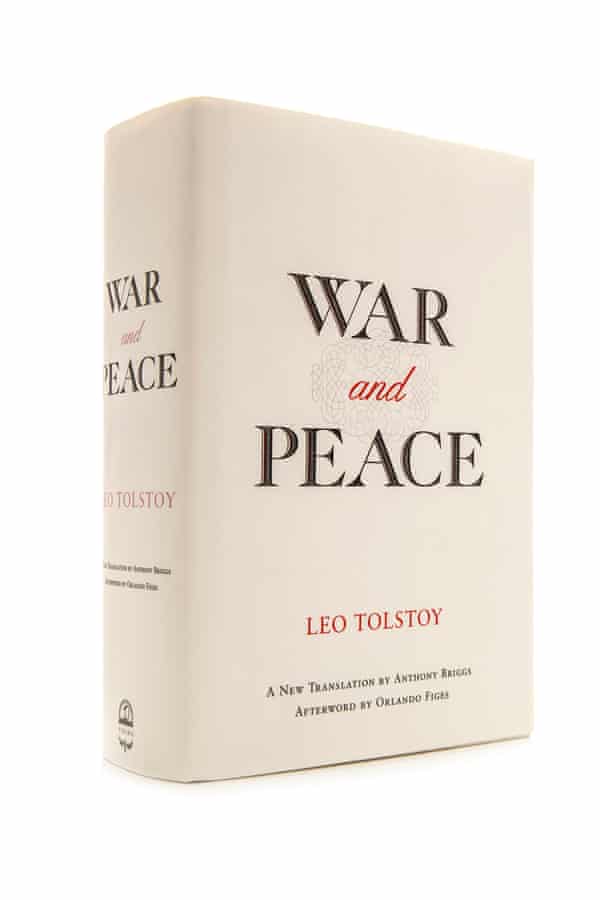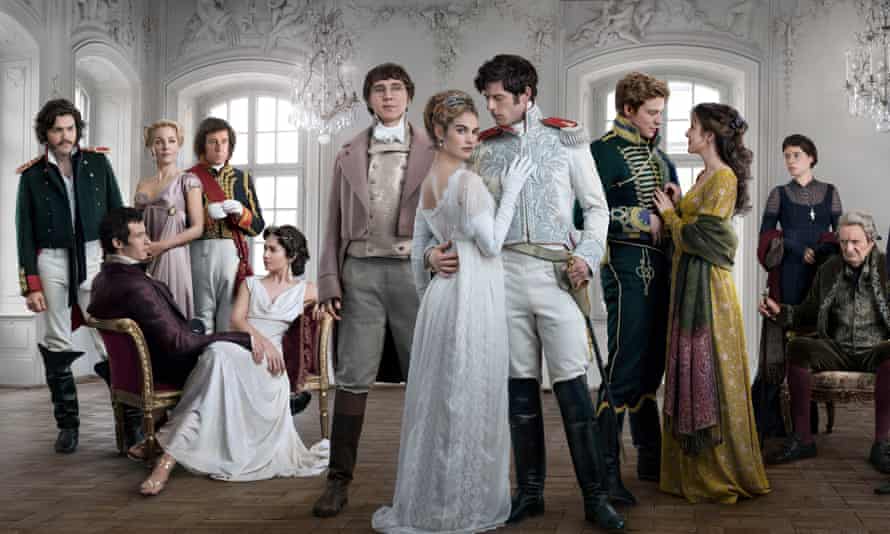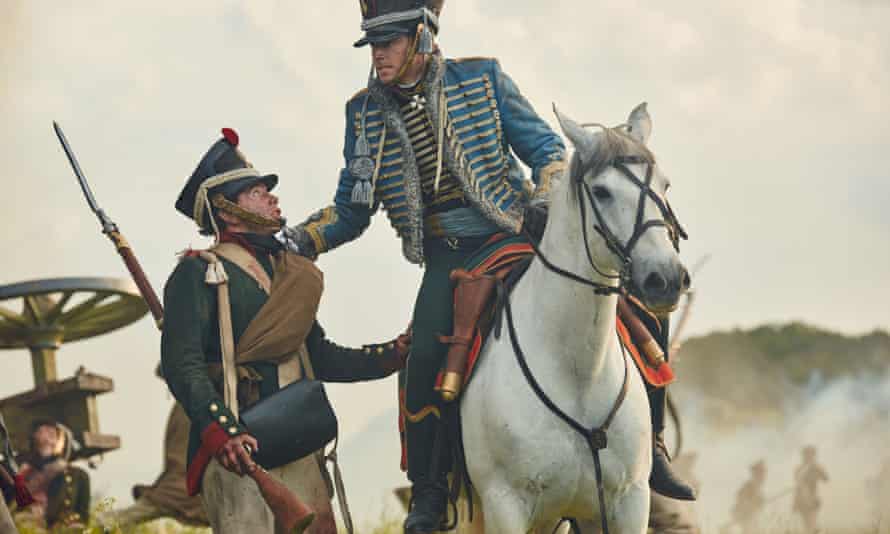How Hard Is It to Read War and Peace
K y wife and I are watching the showtime episode of the BBC adaptation of War and Peace in silence. Fifteen minutes in, I am agape to say what I am thinking, which is: I am confused. Who are these people? How are they connected? What are they talking most? I am adamant not to speak first.
"I don't call up any of this," my wife says. I nod, and and so I think: call back it from when? Something occurs to me.
"Have you read War and Peace?" I say.
"Of course," she says. "I skipped all the war bits."
I have not read War and Peace, and I am so unacquainted with the story that I take piddling thought of what I am missing. I know it concerns (among other things, I'm guessing) the Napoleonic wars, and I know information technology is long. I have committed it, forth with several other titles, to a mental list labelled Great Works to Save For a Hereafter Fourth dimension When You Are Bedridden.
Only before episode one is finished, I have decided that I am going to read War and Peace. I imagine myself sitting down to episode 2 armed with more than background than my wife could hope to command. I will respond her befuddled queries past maxim: "That is Count And then-and-so who, you lot will no dubiety recall, is promised to immature Princess Whatshername, though their families are confronting it." I volition not skip the war $.25. I'k non a particularly fast reader, only who cares? I have a whole week.

Day i
Afterwards scanning our bookshelves in vain the side by side morning, I approach my wife at her desk.
"Do we actually have a copy of State of war and Peace?" I say.
"What for?" she says.
"No reason," I say.
"We do somewhere," she says, turning to stare at the bookshelves behind her. "It'due south cherry-red and secondhand, and I don't know when I concluding saw it. It could be absolutely … Oh, there it is." She pulls an unassuming erstwhile hardback off a high shelf and easily information technology to me.
"This doesn't look too daunting," I say, surreptitiously opening it from the dorsum to look at the final page number: 428.
"That's book one of three," she says, handing me two more books. I take the stack upwardly to my function, open up volume one, skip the introduction and begin reading folio 1.
Fifteen minutes later, I am however on folio one. There is something about the opening – a lengthy, uninterrupted clamper of speech – that will not sink in: "Well, prince, what did I tell you lot? Genoa and Lucca accept become the belongings of the Bonapartes. Now, I requite you fair warning, you will forfeit your position as my friend – as my faithful slave, every bit y'all choose to say – if you persist in disbelieving in war, and are still determined to defend all the horrors and atrocities perpetrated past this Antichrist – for that he is Antichrist I am convinced …" There is more, merely you lot get the idea. It takes a bit of nerve, I call up, to start a novel with a lengthy quotation from an as yet unidentified speaker, unless you lot mean to try the reader's patience from the start.

An 60 minutes later I am on page 12, and I know the speaker of that opening paragraph to be Anna Paulovna Scherer, aka Gillian Anderson. But that is about all I know. Old familiar questions surface: Who are these people? How are they connected? What are they talking nigh? After a while I have to put the book down to get on with other things. I tin can't merely lie about reading all twenty-four hour period similar some bespectacled Russian blueblood. When I turn out my bedside light that night, I am on page 23. But 1,238 pages to go.
Day 2
My confusion equally to who is whom has subsided but a petty. It's not just that there are so many characters, but that they each have so many names. Along with a first name and a family proper name, a character may also possess a diminutive, a patronymic, a title and possibly a military rank. They are addressed variously, depending on who they are talking to. So Princess Drubetskaya is Anna Mikhaylovna to her friends. The Rostov family has two Natalias, who both also answer to Natasha, i of whom is as well Countess Rostov, or just the Countess.
My copy of the volume – the 1949 Everyman's Library edition – makes things worse. A publisher's note says information technology is based on the so-called "anonymous" 1886 translation which, I get together, was originally translated into English language from a French translation. The main problem is that the names are non rendered in the modern fashion. "Bezukhov" is spelled "Besoukhow". Prince Vassily is known, from folio one, every bit Prince Basil.
Wikipedia offers a fairly comprehensive list of characters, only most descriptions also include a terrible spoiler: "Had an matter with Natasha Rostov"; "later loses an arm".
When it comes to keeping things straight, I notice I am entirely reliant on the BBC accommodation. Once I can identify a grapheme as, say, Rebecca Front, I can assign all five of her names to i confront.

I read on the tube in the morning. In the afternoon, I fall asleep on the sofa with the book on my face. I finish the day on page 78. And so far in that location have been no state of war bits to skip.
Day three
I am reliably informed by a colleague who has read War and Peace that I need not bother with Tolstoy'south 100-odd folio digression on the nature of freemasonry. That sounds an awfully long style away. Later iii days I nonetheless haven't covered all the events that occur in episode i of the Television version. Merely it is always heartening to recognise a scene from the dramatisation: the death of one-time Count Bezukhov; Andrei Bolkonsky'south exit-taking; giddiness in the Rostov's drawing room.
For the moment, however, I can exit the drawing rooms behind. At last, nosotros are at war. This part is confusing in a whole new way. Titles and ranks are used interchangeably by the narrator. Aide-de-camps assemble in shoals in anterooms, i indistinguishable from the other. New characters arrive with every turn of the page. Come on, I keep thinking – let'south become the fighting started, and sparse the field out a piddling.
My edition has near no footnotes, so I read with my telephone at my elbow, in case I experience that I need to know what is meant by "a native of Little Russia" (a Ukrainian, basically), but more often than not I just button on, blinkered by ignorance. More knowledge would only slow my stride. I am sure information technology will all brand sense in the cease.
"Are you still reading State of war and Peace?" says my youngest son, finding me hunched over the volume in the kitchen.
"What practice you mean, still?" I say.
"You lot know information technology's on Television set, right?"
"Yes, that's the whole … never mind."
I finally put down the book just after midnight, on page 186. The type is tiny, by the way. Did I mention that?
Twenty-four hour period four
Battle, when it finally comes, is gripping. I can't imagine skipping this function. What is usually referred to every bit the Fog of War is here, rendered in all its terrifying confusion. Even success on the battlefield happens by accident, when orders are delivered and the battery commanded past Tushin fails to retreat. The experiences of Nicholas Rostov are particularly bright, considering I saw them on Television set quite recently.

Past now I experience I take caught the rhythm of the novel, and adult an instinct for knowing when a character is not going to problem me again, then I needn't worry also much near his rank or nickname. I now find myself dorsum in St Petersburg, and I have been abroad just long plenty to forget who anybody is. Some 230 pages in, I realise with a beginning that Helene Kuragina is actually the daughter of the person I have been calling Prince Basil. I am sure I was meant to know this before. When I go back to consult the Goggle box version, I see this was made clear in the first 3 minutes. Every folio I read from now on is uncharted territory, at least until episode two arrogance.
I'm already 1 6th of the way through War and Peace; with luck and a off-white wind, I effigy I can beat the vi-part TV adaptation past a week. And when at some point in the futurity I find myself bedridden, I can just scout erstwhile episodes of Glory Antiques Road Trip. I will have earned it.
Source: https://www.theguardian.com/tv-and-radio/2016/jan/10/just-1238-pages-to-go-could-you-read-war-and-peace-in-a-week
0 Response to "How Hard Is It to Read War and Peace"
Post a Comment